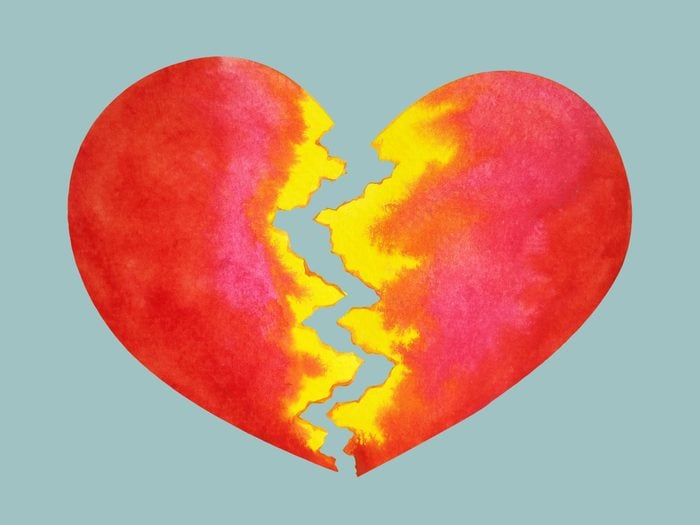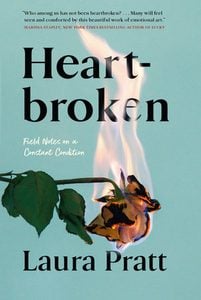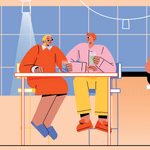When You’re Ghosted After a Breakup

An excerpt from Heartbroken, a book written by journalist Laura Pratt about her struggle to understand and cope with a breakup.
Trigger warning: This excerpt mentions suicide and self-harm.
Two and a half silent years after sustaining the break up, I was still smarting and yearning. He’d never said a word and I let that injure me constantly. Disregard, says Kipling D. Williams, an American psych prof who’s studied the subject extensively, is the ego’s cruellest assailant. He calls ostracism “among the most devastating experiences a person can endure.” Animals who are ostracized don’t survive. Once set adrift by their crew, they lack both the resources to find food and the pack for protection. For humans, exceptionally social creatures whose dependence on others is arguably bigger than anyone else’s, close relationships are equally critical. If our ancestors couldn’t sustain associations with intimates, they perished. No wonder psychology emphasizes the importance of creating and maintaining relationships. “Without friends, no one would choose to live, though he had all other goods,” Aristotle said. “There is something in staying close to men and women, and looking on them, and in the contact and odour of them, that pleases the soul,” said Walt Whitman, 22 centuries later.
In the book he wrote with Erika J. Koch, Emotional Responses to Interpersonal Rejection, Mark Leary considers the consequences of a soul denied that pleasure. If you’ve been left behind, he says, you might suffer sadness, jealousy, isolation, envy, guilt and embarrassment. In the moment, people who’ve been rejected experience anxiety and depression; in the longer term, they internalize low levels of self-esteem and a general lack of well-being. Rejection slows their heart rate. Some try to kill themselves; some succeed. My children and parents, to whom I was deeply connected, kept me from even considering that option.
To the list add aggression, linked to rejection in a 2001 Surgeon General of the US report. Think of school shootings and dismissed employees going postal. Still, the research is clear: Much of the aggression that rejection arouses is pointed inward. Same with disdain. “I was rejected,” we say, the passive participants in our own tragedies. It’s a hell of a posture to take: Just when our ego is at its lowest, we heave up a sack of self-loathing. Rejection does half the damage, says American psychologist and author Guy Winch; we do the rest.
Research also uncovered a connection between social exclusion and reduced intellectual functioning. Multiple studies reveal that our cerebral performance dries up if we think we’re going to be rebuffed. Participants told they would end up alone performed significantly worse on general intelligence tests—were less able to retrieve information from memory and bombed the logic—than those who believed their future would be filled with belonging and meaningful relationships.
Perhaps most significantly, researchers learned that we castoffs feel the pain of it in our muscles and bones as much as our psyches. Scientists confirmed in 2012 that physical and social pain experiences rely on shared neural substrates, in the first study of social exclusion in humans.
They believe that’s so because, a thousand generations of rejection ago, our ancestors’ social attachment systems co-opted the pain system’s siren to prevent the species-ending consequences of social separation. This mingling of our social and physical needs, said American neuroscientist Paul MacLean, helps explain why “a sense of separation is a condition that makes being a mammal so painful.”
—
Christmases had turned painful when my kids’ dad and I split. It was lonely overseeing the season by myself, and I suffered the usual guilt separated parents feel about stealing their family’s easy experience with it. But when I met Sam, from that very first holiday and for six more after, my joy returned.
We didn’t see each other at Christmas, holding out for Boxing Day reunions that kicked off animated week-long holidays to the south. But we were part of each other’s celebrations just the same. We both had traditions of attending Christmas Eve services—once-a-year appearances at respective neighbourhood churches, me before dinner in Toronto, him at midnight in Montreal. Christmas magic could collapse geography and time, so when we lit our candles off our neighbours’ and sang “Silent Night” in the flickering ambience they cast across our programs, we could have been together, our thighs touching on the same pew.
There’s nothing like Christmas Eve. No night’s so crisp or huge or enchanted as the one that delivers the world across into Christmas. Our conversations on these nights were always intimate and effervescent, both of us still fairy-dusted from our church visits and the walks home in the snow after, chatting breathlessly to people we hadn’t spoken to in a year. I’d put Sam on speakerphone so I could wrap presents while we talked. I loved hearing about his Christmas Eves in the cozy church he’d visited since he was a kid. It was within walking distance of both his apartment and his childhood home, where his parents still lived. Years earlier, Sam had stepped up for the resident caretaker, whom the church was mistreating, and he served for a time on its board. Sometimes he’d play at a special occasion there, releasing all his elaborate music into the hallowed rafters. When the little church closed from lack of business, Sam was so sad. I tracked down a brass offering plate from the congregation and got it engraved for him.
After the Christmas Eve service, Sam used to walk a grateful widow home, lending her his arm across the snowbanks, basking in the community of the special night in his beloved city. He would tell me about that, his annual encounter with this woman he’d known since he was young, and I would cut wrapping paper and write tags and feel grateful. “I wish you were here,” I’d say, and he would tell me something like “I am, baby. I want you to feel it.” And I would.
Then I’d tuck the phone under my ear and deliver all the gifts to the tree and drink Santa’s milk and fill the stockings. And all the while Sam would talk to me and make my solitary maternal labours—bloated this night with so much expectation—less solitary. When it was at last all set up for morning, I’d head upstairs. “Look outside now,” I would tell him from my dark bedroom window before we said good night, and Sam and I would peer across the crackling Christmas Eve at each other as though there was no sky between us at all.
I thought about all this on the second Christmas Eve after he left. About the candles and the carols, the widow and the snowbank. His arm. I thought of it while I went through my Christmas rituals in silence, arranging the presents under the tree, tucking oranges and lottery tickets into stockings, writing Santa’s blocky notes of thanks for the cookies. Then I turned out the lights and went up the stairs alone, no one in my ear saying I’d done a good job putting on another Christmas for my children, no one who noticed, no one who knew.
When I looked out the window into the deep magic sky the second Christmas Eve after Sam left, my gaze went on and on, didn’t meet up with anything at all.
—
“My dear little love,” I wrote Sam one afternoon when he’d been quiet for more than two years. “I think it would help me, if your heart and soul are utterly and undeniably convinced that they are done with me, if you would write and tell me so. This silence has been crazy for me.” Elie Wiesel’s comment about the opposite of love being indifference was never far from me in this stillness.
The silent treatment is the most insidious quill in ostracism’s quiver. When someone expecting a door gets a wall, the blow to the ego is tremendous. It generates the special quality of suffering that comes with being erased. Here is soundless rebuke—an ancient tool of psychological punishment—and its power to steal its victims’ identity and voice and value. To send them spinning in squalls of isolation and grief. To make them question not only the relationship they had but the person they are. Here is disregard, and the layer it adds to rejection, the combination confirming that you matter not at all.
Even a fiery argument grants both participants the dignity of voice—there’s a sense of control inside the flinging invective. That’s not the case with the silent treatment, which shuts one party up and down. “Silence,” said George Bernard Shaw, “is the most perfect expression of scorn.” Mark Leary’s theory says self-esteem actually bottoms out not when people believe others despise them, but when they believe others feel neutrally about them. So we feel just as badly about ourselves when people ignore us as when they hate us.
Various academics have taken a run at the subject over the years. One of them, Paul Schrodt, a communications prof from Texas Christian University, reviewed the relationships of 14,000 people. Afterward, he declared the silent treatment “the most common pattern of conflict” they contain. “It does tremendous damage,” he said.
With Meidung, an exercise of shunning practised in the Amish faith, individuals are actively singled out for comprehensive neglect. Practitioners conspire to ignore other humans—refusing to speak with them or eat with them or even acknowledge them. The victims, accused of violating the Ordnung, the church’s unwritten expectations for adherents’ daily living, suffer a “slow death,” said American lawyer Margaret Gruter. The faithful defend Meidung with a biblical prophecy: “And if any man obey not our words by this epistle, note that man, and have no company with him, that he may be ashamed,” says 2 Thessalonians 3:14. Mennonites, Hutterites and Jehovah’s Witnesses also practise forms of shunning.
In 1947, a court in the heart of Ohio’s Amish country heard a case of Meidung. The plaintiff, a 33-year-old Amish farmer named Andrew J. Yoder, sued a bishop and two preachers from his old-order Amish church for $40,000 in damages and a court injunction against a “boycott” he alleged they’d arranged for him. Yoder claimed the church had “mited” him for five years for purchasing a car so he could transport his polio-stricken daughter to medical appointments, a move that contravened church doctrine. The community disregard made him feel like a “whipped dog,” Yoder told the jury at his civil trial. But his opponents were convinced that this man had broken the pact he’d made with God with this acquisition, and that their actions complied with the commandments.
Yoder said he was satisfied with the verdict, which awarded him $5,000, but the payout allegedly did nothing to mitigate the Meidung of this man whose ego had been flattened under the boots of loved ones fleeing him. “In the end, we will remember not the words of our enemies,” Martin Luther King Jr. said, “but the silence of our friends.”
—
And so I wasn’t alone. Nor were the helpful people who pointed out that if I didn’t write to Sam, I wouldn’t be shunned by Sam. But if I didn’t write to Sam, I wouldn’t be okay. Be quiet, he’d declared with his retreat—but I still had things to say. And I would say them until I didn’t care to anymore. I had no other valve. My head was jammed and I had to unload. It was a perverse delight, this unorthodox exercise of calling to someone who never called back, and I would draw it out, savouring the purpose it gifted my indifferent life for a day or longer while I worked on my note, always anxious, always hopeful. He never said a word. My ego never knew what hit it.

Excerpted from Heartbroken by Laura Pratt. Copyright © 2023 by Laura Pratt. Published by Random House Canada, a division of Penguin Random House Canada Limited. Reproduced by arrangement with the Publisher. All rights reserved.
Next: 20 Breakup Movies That’ll Help You Get Over That Relationship




